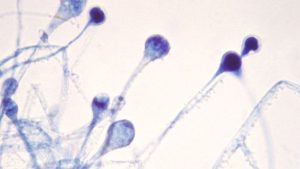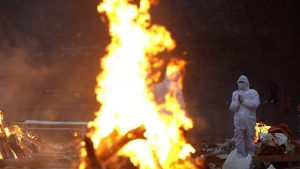India has reported more than 8,800 cases of deadly "black fungus" in a growing epidemic of the disease.
The normally rare infection, called mucormycosis, has a mortality rate of 50%, with some only saved by removing an eye.
But in recent months, India saw thousands of cases affecting recovered and recovering Covid-19 patients.
Doctors say there is a link with the steroids used to treat Covid. Diabetics are at particular risk.
Doctors have told the BBC it seems to strike 12 to 18 days after recovery from Covid.
The western states of Gujarat and Maharashtra have reported more than half of the reported cases. At least 15 more states have reported between eight and 900 cases. Following the rise in cases, India's 29 states have been told to declare the disease an epidemic.
Newly opened wards to treat patients suffering from the disease around the country are filling up fast, doctors say.
[caption id="attachment_9352" align="aligncenter" width="982"] Mucor mould is commonly found in soil, plants, manure, and decaying fruits and vegetables[/caption]
Mucor mould is commonly found in soil, plants, manure, and decaying fruits and vegetables[/caption]
 Mucor mould is commonly found in soil, plants, manure, and decaying fruits and vegetables[/caption]
Mucor mould is commonly found in soil, plants, manure, and decaying fruits and vegetables[/caption]
At the 1,100-bed state-run Maharaja Yeshwantrao Hospital in the central Indian city of Indore, the number of patients had leapt from eight a week ago, to 185 on Saturday evening.
More than 80% of the patients need surgery immediately, Dr VP Pandey, head of the hospital's department of medicine, told the BBC.
Dr Pandey said the hospital had set up 11 wards with a total of 200 beds to treat black fungus patients: "This surge in patients was definitely unexpected," he said. "We used to see one or two cases a year previously."
He reckoned that there were at least 400 patients with the disease in Indore alone.
"The black fungus infection has now become more challenging than Covid-19. If patients are not treated in time and properly, than the mortality rate can go up to 94%. The cost of treatment is expensive, and the drugs are in [short supply]," Dr Pandey said.
[caption id="attachment_9353" align="aligncenter" width="864"] Life in India's capital has changed beyond recognition under a deadly second wave of Covid-19 infections (12 May 2021 report)[/caption]
Life in India's capital has changed beyond recognition under a deadly second wave of Covid-19 infections (12 May 2021 report)[/caption]
 Life in India's capital has changed beyond recognition under a deadly second wave of Covid-19 infections (12 May 2021 report)[/caption]
Life in India's capital has changed beyond recognition under a deadly second wave of Covid-19 infections (12 May 2021 report)[/caption]
Doctors say amphotericin B or "ampho-B" is an anti-fungal intravenous injection which has to be administered every day for up to eight weeks to patients diagnosed with mucormycosis. There are two forms of the drug available: standard amphotericin B deoxycholate and liposomal amphotericin.
Dr Pandey said he had collected data concerning 201 patients from four hospitals in the city.
The majority of the patients had recovered from Covid-19 and were male. Most of them had been treated with steroids, and all had underlying conditions, mainly diabetes.
A separate study by four Indian doctors has looked at more than 100 cases of Covid-19 patients who had contracted mucormycosis. It found 79 of them were men, and 83 of them suffered from diabetes.
Another study of 45 black fungus patients in two Mumbai hospitals found that all were diabetics or diagnosed with diabetes on admission. They all had very steep blood sugar levels.
"No patient of mucormycosis has normal blood sugar," Dr Akshay Nayar, an eye surgeon who has treated a number of patients, told the BBC.
What is mucormycosis?
Mucormycosis is a very rare infection. It is caused by exposure to mucor mould which is commonly found in soil, plants, manure, and decaying fruits and vegetables. "It is ubiquitous and found in soil and air and even in the nose and mucus of healthy people," says Dr Akshay Nair, a Mumbai-based eye surgeon.
It affects the sinuses, the brain and the lungs, and can be life-threatening in diabetic or severely immuno-compromised individuals, such as cancer patients or people with HIV/Aids.







